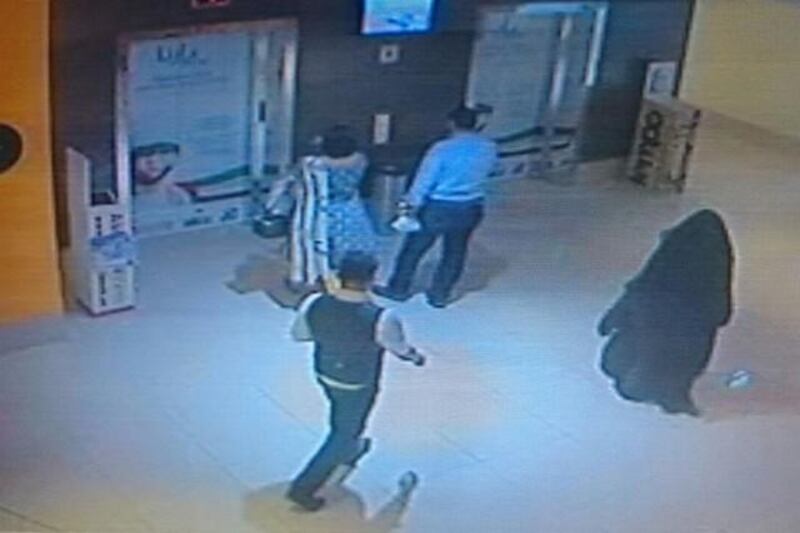ABU DHABI // A British mother nearly became the victim of the Reem Island killer – but was spared because she was pushing her baby in a pram, the Federal Supreme Court heard on Tuesday.
In a dramatic prosecution video, the accused, Alaa Al Hashemi, 30, re-enacted the murder of Ibolya Ryan in Boutik Mall on December 1 last year.
The video showed how she had walked into the mall, asked the security guard where the toilet was and took a magazine while on her way there. In the film, she says she waited with a knife hidden in her right sock, until the bathroom was quiet.
She considered attacking the British woman but changed her mind because the woman was pushing a baby in a pram. The victim then walked in and the accused asked her for help to get into a disabled toilet.
Al Hashemi says in the video: “When the victim turned, I locked the door and asked her to sit down on the side of the toilet.
“When she refused I took out the knife. She had kept her bag in front of her and I asked her to give it to me. When she did she tried to attack me so we fought in this corner.
“She started screaming for help and I pushed her to the wall where I stabbed her – I don’t know how many times, but mostly in her chest area.”
The door was pushed open by a security guard and Al Hashemi ran to the lifts, leaving the murder weapon behind.
In the film Al Hashemi confesses to the murder and says she wanted to kill an expatriate to disturb peace in the UAE.
But after the film was shown in court she said: “That is me, but it is like I am dreaming.”
“I don’t remember doing any of this or saying it,” Al Hashemi told the court.
The public prosecution presented the court with a USB drive and eight CDs that included images, videos and a recorded phone call from the day of the incident.
The drive also contained CCTV footage of Al Hashemi entering the mall at 1.12pm on December 1 and leaving at 2.45pm.
When questioned by Judge Falah Al Hajeri about the footage, Al Hashemi said: “I suspect that it could be me, but I don’t remember anything about it.”
Prosecutors also showed a video of her going into and leaving the building where she is accused of planting a bomb. The accused said only that she recognised her husband’s car from the video.
A recorded phone call to the police was also played in court, in which Al Hashemi had called to inform them of a “bleeding expatriate woman on Saadiyat Island”. She had confused the name of the island.
The accused said she did not remember this either.
The judge then called on the first witness, the head of the criminal investigation unit, who said two separate reports were lodged on the same day concerning the two incidents.
The team found out that the car plate number and the mobile number belonged to the same man: Mohammed Al Habashi, the husband of the accused.
The court heard that he was also in the custody of the State Security department, for reasons that were not disclosed in court, so he could not have used the items. The team then inferred that the accused was the most likely suspect.
“We were able to identify her based on the description in both incidents. Both had the same clothes and demeanour,” the witness said.
Another witness, an explosives expert with Abu Dhabi Police, said the bomb was well made and would have required instructions or training to be able to create it.
He said the reason it did not detonate was a glitch in its safety clasp.
If the bomb had gone off, the explosion could have reached “up to 20 to 30 metres in distance”, he said.
“The effect could ruin the walls, break windows and break down doors,” the expert said.
The third witness, an expert in online threats against the UAE, said his findings showed the accused had been using an alias on a “jihadism website”, where she published statements supporting Al Qaeda and ISIL.
She had also posted images insulting symbols of the country, instructions on how to create weapons and bombs, and ISIL flags.
Judge Al Hajeri ordered that the accused be referred to a medical committee to evaluate her mental and emotional state, and that she take a technical test to see whether her voice was identical to the one on the police recording.
He also asked for a blood money settlement for the victim’s family.
Five other witnesses were called to give evidence at the next hearing, which was set for next Tuesday.
aalkhoori@thenational.ae






